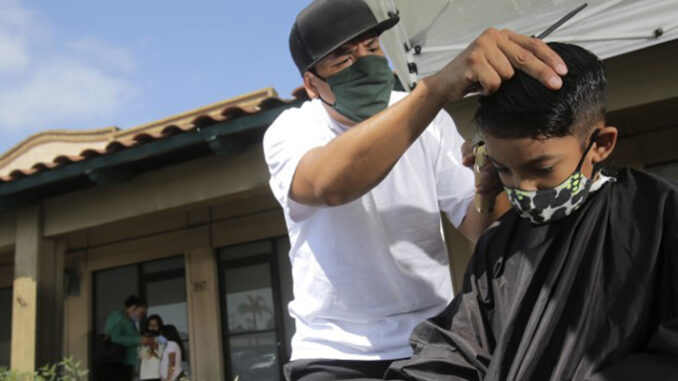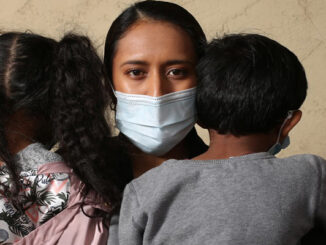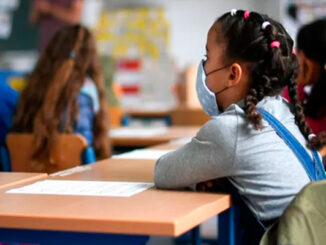
by
Oralia Soto had pain in her lungs, but being the sole caregiver for her 12-year-old diabetic great-granddaughter left no time to see a doctor.
When Soto, 87, finally sought medical care, she was critically ill with the coronavirus and needed to be put on a ventilator. She died days later, one of 15 members of a large Latino family in Texas’s Rio Grande Valley who fell ill with or succumbed to the virus.
“It is just too much to handle,” said Brenda Benitez, Soto’s niece. “I feel numb inside. I just pray.”
The novel coronavirus is devastating Latino communities across the country, from California’s Imperial Valley to suburban Boston and Puerto Rico. Workers at Midwestern meatpacking plants and on construction sites in Florida are getting sick and dying of a virus that is exacerbating historic inequalities in communities where residents, many of whom are “essential” workers, struggle to access health care. The undocumented are largely invisible.
Latinos, who are not a racial group and come from diverse backgrounds, make up an increasing portion of deaths from covid-19, the disease caused by the coronavirus. More than 36,500 Latinos have died of the virus, according to data from the Centers for Disease Control and Prevention analyzed by The Washington Post.
“If you look at all the negative factors, risky jobs or unemployment, unsafe housing, poor air quality and preexisting conditions, it’s all people of color,” said Carlos Rodriguez-Diaz, an associate professor at the Milken Institute School of Public Health at George Washington University.
“It’s not because we are non-White, it’s because of the social conditions that historically placed us at a disadvantage,” Rodriguez-Diaz said. “These are not new, but covid is giving us the unfortunate opportunity to highlight these factors.”
The disparities are particularly acute in Texas, where people who identify as Hispanic or Latino comprise 40% of the state’s population. They are more likely to be hospitalized, face financial ruin or die of the virus than their White neighbors, experts said. The burden on Hispanics is diverse, affecting recent migrants to Houston, natives of San Antonio, indigenous immigrants in Austin, Dallas business owners or those who called the Borderlands their home before it was Texas.
State data presents an incomplete picture of how Latinos in Texas are faring, because not all municipalities report race or ethnicity information. But when Texas reworked its coronavirus data in July, it added 600 additional virus deaths – 47% of which were Latinos.
A close look at the municipalities that report demographic data show Latinos comprise the bulk of coronavirus cases, hospitalizations and deaths in the counties that include Austin, Dallas, Houston and San Antonio. On the border, where Latinos are a majority of the population, the number of virus patients overwhelmed hospitals this summer.
These numbers almost certainly do not reveal the true impact.
“There’s likely an undercounting of how deeply and severely affected Latinos have been by coronavirus,” said Luis Ostrosky, a professor of medicine and epidemiology at the University of Texas Health Science Center at Houston.
Physicians, community activists, politicians and researchers say the long-term psychological, economic and physical effects on Latinos are unknown. But what happens to Latinos will impact everyone, in ways both expected and unforeseen.
Jose Lisandro Orellano came to the United States expecting to struggle. He learned that to prevail, an immigrant needs a positive attitude and sheer will. Orellano never imagined how the coronavirus would test his two decades of built-up resilience.
The 40-year-old caught the virus while working on a garbage truck crew. He doesn’t know where or how it found its way into his body, but it made its presence known. Fever, headaches and a strangling cough kept him at home for six weeks trying to cure himself with teas and medicine from his beloved El Salvador.
“My brain was telling me, ‘You are going to die,’ ” said Orellano, who lives in immigrant-heavy Southwest Houston. “But my heart was telling me to keep on fighting.”
Orellano had saved money in case he became sick, but he couldn’t afford to go to the doctor without insurance. So the teas, of ginger, onion and garlic, became more elaborate. He lost about 30 pounds before his body let him walk up stairs without gasping for air.
Texas has the highest uninsured rate in the country and is one of several states that refused to expand Medicaid, making it difficult for millions of low-income people to access affordable treatment. For many sick with the virus, it’s only when the symptoms become unbearable that they yield to an emergency room or clinic.
But by then, the virus has spread. Advocates said the virus is pervasive in apartment complexes where immigrants live in tight quarters, making it impossible to practice social distancing.
Delmis Lopez’s teenage daughter was the first in her household to show symptoms. Soon, so did other of the 19 family members who live with her in a three-bedroom Houston apartment. Her children have Medicaid, but Lopez’s relatives are asylum seekers who arrived from Honduras last year. They were too afraid to seek medical care.
The family hunkered down. Three weeks later, their strength returned. They were lucky, Lopez, 34, said. So was Gerson Bonilla, though many people he loves were not.
“This is completely out of control,” said Bonilla, who along with his brothers runs a business installing and repairing air conditioning in Houston. Each of them recovered from the coronavirus in early July, but they have friends, cousins and nephews who didn’t.
“I wonder if the authorities are really doing everything they can to protect us,” he said.
Angela Orea, a community organizer with the Metropolitan Organization of Houston, said each day she receives desperate calls from families trying to get tested or find care. Many struggle to find transportation. Some who aren’t sick are moving out of their homes or apartments because they lost jobs and can no longer afford rent.
Every day, Amelia Averyt sees coronavirus patients at Legacy Community Health Clinic in Houston who waited too long to seek help after home remedies failed. The results can be particularly tragic for the undocumented, she said. When a family gets sick, she said, members vow to defeat the disease and take care of each other with minimal medical intervention. The repercussions can be devastating.
Adela Carvajal, 73, and her brother Atanacio Carvajal, 65, never missed a day of work when the temp agency called with construction jobs – considered “essential” during Texas’s stay-at-home order this spring. Adela often accompanied her brother to the same work sites. He pounded nails and she cleared debris. After work, they headed to the Austin apartment they shared for 19 years.
Their plan had always been to save enough money to return to Acapulco, Mexico, open a clothing store and live out what remained of their graying lives. But in May, Atanacio started to feel a bruising pain in his back.
Adela tended to her younger brother the way she always had, trying to massage away the pain. But then she started having gastrointestinal issues. Assuming it was a bug, Adela kept working. When the medicine didn’t help, she booked a doctor’s appointment.
Her brother improved, but she deteriorated. Adela left her bed only to reach the bathroom. Atanacio and a friend took turns checking on her at night. But Atanacio was tired and dozed off the night before his sister was scheduled to see a doctor.
She stopped breathing a few hours later. He called an ambulance, but she was gone.
“I took her face into my hands and she was still warm. So I put my hand on her heart but I could not feel it beating,” he said.
“Seeing her leave us that way has been hard to forget,” he said.
The family later learned six men who worked with Atanacio Carvajal had tested positive for the coronavirus. The company that hired the siblings did not respond to a request for comment. Atanacio was in quarantine for a month and now lives with a niece.
Laura Perez-Boston of the Workers Defense Project, a Texas advocacy group, said members across the state are falling ill. They receive hard hats, masks and gloves, but laborers share tools and carpool; their shifts aren’t staggered, and portable toilets may not be cleaned regularly, she said.
“They feel like their lives aren’t valued and they’re not being heard,” Perez-Boston said.
When health officials recommended limiting gatherings or interactions to family, they probably weren’t counting the same way Latino families do. A matriarch in Laredo celebrated the Fourth of July with her family of 14 children and 65 of grandchildren. She was one of 70 people in Laredo who died of coronavirus during a three-week span this summer, said Ricardo Cigarroa, an internist and cardiologist at Laredo Medical Center. Cigarroa was sickened by the virus but has recovered.
The Latino community’s source of strength, the family, has also become its undoing.
“Your highest risk factor is who you live with,” Sharon Davis, chief medical officer of Dallas’s Los Barrios Unidos Community Clinic.
More than a quarter of Latinos nationwide live in multigenerational households. Texas has the third-highest rate in the nation of such living arrangements.
Jocelyn Hernandez, a nurse at Davis’s clinic, lives with 10 family members, including her siblings, parents, an aunt, a cousin and a 6-year-old niece. All followed the decontamination rules Hernandez helped establish. She and her sister were the assigned grocery shoppers of the home.
But they could not control for everything. There are six rooms and three bathrooms in the house but one preferred shower.
Hernandez, 27, starting feeling feverish at work at the same time that her father, who has diabetes and hypertension, was bothered by chest congestion. Her mother felt her allergies flaring up.
Their symptoms weren’t severe at first, but everyone got tested.
All but the child were positive.
The family isolated themselves in their rooms, wore masks inside the house and stayed in touch by phone. Hernandez’s aunt was admitted to the hospital. One night, Hernandez heard her father coughing. She called him, but he could barely talk and hung up.
Hernandez’s parents ended up in neighboring ICU rooms, motivating each other using the phones attached to their beds.
“You need to get better.”
“We both have to leave this hospital together.”
“Let’s do it.”
“I’ll see you in recovery.”
“Were doing this.”
Juan and Maria Hernandez left the hospital July 2, hand-in-hand.
As the Hernandezes fought to survive in Dallas, Monica Muñoz’s father was saying goodbye in San Antonio. Her grandfather died 24 hours later.
The two heads of proud Mexican American households left behind a devastated family, many of whom live in the same neighborhood – there are so many Muñozes on the block where they live that the street should be named after them.
Ernesto Muñoz moved there first, leaving Mexico 36 years ago with the hope of returning. The 66-year-old worked as a maintenance man in a meat factory past retirement age because he was so grateful to the company that gave him his first opportunity. He was never paid what he deserved – until this year, his daughter said. His hard work, she said, felt validated.
2020 was going to be Ernesto’s year. He promised his wife it would be his last working. He finally had the money saved to build a little house in Mexico.
Monica Muñoz lives on the street, in a house sandwiched between her parents and grandparents. At the start of the pandemic, Monica, who works in occupational safety, sat down with her father to go over safety protocols. In mid-June, she noticed her father had come home early. He had not been feeling well.
Ernesto Muñoz didn’t want to go to the hospital. Like many Latinos, he feared that once you go in, you don’t come out. After a week of being sick, he went. Four days after he was admitted, Muñoz was on a ventilator. He called his children before he was intubated.
“He talked to us like it was a normal day,” Monica Muñoz said. It was strange, but she could feel he was trying to say something. She later learned her father told her brother the family was now his responsibility. “That was his way of saying goodbye.”
Her grandfather was hospitalized days later. As the oldest, Monica helped handle the piles of paperwork, the nurse phone calls that came in the middle of the night and, ultimately, the funeral arrangements. Her father died July 6. Her grandfather, July 7.
“You know, sometimes it feels like we’re just another number, another statistic. I’ve seen on social media how people say, it’s just the 1% of the population that it’s affecting,” she said. “But it happened to us. Two heads of households. Two fathers.”
Gil Vasquez needed his father to recover from the coronavirus.
Vasquez, 40, who has lived with muscular dystrophy since birth, depends on his father to be his arms and legs. Wherever Vasquez’s mind took him, his father, also named Gilberto Vasquez, gladly did the walking for his son. The elder Vasquez carried his son’s school books and typed out his papers. The two traveled the country, worked in the same bank and are now preparing for the son’s bar exam.
The 73-year-old was so careful not to expose his son to the coronavirus that he limited his ventures outside the home to a radiology center appointment and a visit to the carwash. A scratchy throat devolved into the father losing control of his body. He collapsed at his San Antonio home and was on a ventilator by mid-July.
“This is the longest I’ve ever been without him,” Gil Vasquez said of his father. “You can’t help but think what would happen if he didn’t make it. It would be very hard for me to adjust and try to live my life. My whole life has been around him.”
Vasquez and his mother, who has rheumatoid arthritis, also tested positive for the coronavirus. People always ask him if he is ever angry with God or questions why he was born disabled. Vasquez, who has spent a lifetime subscribing to the “power of positivity” and drawing from his faith, has lots of practice turning the conversation around: Why not me?
But in this moment, the question leaves him breathless. His mind spirals: Had the stay-at-home order not been lifted, his father may not have gone out. Had more people believed the virus was serious, his father may not be fighting for his life. Had people cared more and worn masks, vulnerable Latinos like him and his father may not be suffering. The what-ifs are overwhelming.
“Your human instinct is to question,” Vasquez said. “But it feels selfish on my part. There’s no rewinding the clock. The question now is what can I do to make it better?”
A former banker, Vasquez said he understands why states including Texas reopened so quickly. But he says he believes the choice was at the expense of the vulnerable.
“It’s people of color with no health care, the disabled like me, the elderly,” he said. “And does it matter if it’s for the greater good of the economy if someone is going to get hurt?”
Vasquez senior was in the hospital for nearly two months before he began to respond to treatment. Rehab therapists told him it would be months before he could go home. But the Army veteran was determined to progress in two weeks. His son needed him.
Vasquez remembers nothing about his time in the hospital but coming home was, emotionally, like returning from fighting in Vietnam.
He still gets winded easily. His lungs and throat are inflamed. But he’s back to helping Gil Jr. prepare for the bar next year.
Arelis R. Hernández is a Reporter for the Washington Post covering the U.S. Southern border, Immigration and Texas.



